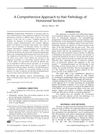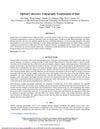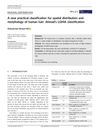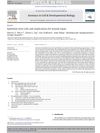Search
for
Sort by
Research
360-390 / 1000+ results
research Control of Human Hair Growth by Neurotrophins: Brain-Derived Neurotrophic Factor Inhibits Hair Shaft Elongation, Induces Catagen, and Stimulates Follicular Transforming Growth Factor Beta 2 Expression
Brain-Derived Neurotrophic Factor (BDNF) slows down hair growth and promotes hair follicle regression.
research Comparative Analysis of Biological Properties of Large-Scale Expanded Adult Neural Crest-Derived Stem Cells Isolated from Human Hair Follicle and Skin Dermis
Skin-derived stem cells grow faster and are easier to obtain than hair follicle stem cells, but both can become various cell types.

research An Innovative Scalp-Dyeing Technique with Gentian Violet Solution During Follicular Unit Extraction for White-Haired Follicular Units
A new method using gentian violet dye makes it easier to see and work with white hair in hair transplant surgeries.
research Efficient Delivery of Transgenes to Human Hair Follicle Progenitor Cells Using Topical Lipoplex
research Dutasteride Nanoemulsion Preparation to Inhibit 5-Alpha-Hair Follicle Reductase Enzymes in the Hair Follicle: An Ex Vivo Study
The dutasteride nanoemulsion could improve hair loss treatment by enhancing drug penetration and retention in hair follicles.

research Hair And Nails: Studies On Hair Loss, Chemical Matrixectomy, And Hair Transplantation Techniques
Women with androgenetic alopecia have fewer terminal hairs, phenol in nail surgery is safe, and a new hair transplant method is faster and less damaging.

research A Comprehensive Approach to Hair Pathology of Horizontal Sections
A new method using visual aids to diagnose hair diseases was effective after brief training.

research Human Pilosebaceous Culture
Hair follicle cells can help heal wounds and study skin diseases.

research Optical Coherence Tomography Examination of Hair
OCT can effectively examine and reveal details about human hair and scalp conditions.

research Autologous Platelet-Rich Plasma: A Potential Therapeutic Tool for Promoting Hair Growth
Platelet-rich plasma can potentially promote hair growth by stimulating cell growth and increasing certain proteins.

research The Effect of Autologous Activated Platelet Rich Plasma Injection on Pattern Hair Loss: Clinical and Histomorphometric Evaluation
AA-PRP injections effectively increase hair count and thickness for male pattern hair loss.

research Hair Follicles’ Transit-Amplifying Cells Govern Concurrent Dermal Adipocyte Production Through Sonic Hedgehog
Cells in hair follicles help create fat cells in the skin by releasing a protein called Sonic Hedgehog.
research Canine Follicle Stem Cell Candidates Reside in the Bulge and Share Characteristic Features with Human Bulge Cells
Canine hair follicles have stem cells similar to human hair follicles, useful for studying hair disorders.

research Hair Biology
The document explains hair biology, the causes of hair loss, and reviews various hair loss treatments.

research Identification of Telogen Markers Underscores That Telogen Is Far from a Quiescent Hair Cycle Phase
Telogen is an active phase with important biological processes, not a resting phase.

research The Effect of Plasma Rich in Growth Factors Combined with Follicular Unit Extraction Surgery for the Treatment of Hair Loss: A Pilot Study
Combining plasma rich in growth factors with hair transplant surgery may lead to faster recovery and better outcomes for hair loss treatment.

research Activity of Type 1 5α-Reductase Is Greater in the Follicular Infrainfundibulum Compared with the Epidermis
The enzyme type 1 5α-reductase is more active in the hair follicle's lower part than in the skin's outer layer.

research Hair Transplant: Evolution and Role in Treating Alopecia
Hair transplantation can effectively restore a natural-looking hairline when properly planned and executed.

research Impact of Preservation Solutions on the Trichogenicity of Hair Micrografts Ascertained by Dermal Papilla Gene Expression
Chilled ATPv-supplemented saline best preserves hair grafts' key genes.

research Androgenetic Alopecia: Modeling Progression and Regrowth
AGA causes hair loss through follicle miniaturization and hair cycle changes; regrowth depends on anagen initiation in kenogen follicles.

research A New Practical Classification for Spatial Distribution and Morphology of Human Hair: Ahmad's LGMA Classification
Dr. Muhammad Ahmad created a hair classification system to help improve hair restoration surgery outcomes.

research Reporting Live from the Epidermal Stem Cell Compartment
The study showed that some hair follicle stem cells wake up to grow hair while others stay asleep, and that the environment around them is important for hair growth.

research Autologous Micrografts Containing Nanovesicles, Exosomes, and Follicle Stem Cells in Androgenetic Alopecia: In Vitro and In Vivo Analysis Through a Multicentric, Observational, Evaluator-Blinded Study
Micrografts are a safe and effective treatment for hair loss in both men and women.

research Wound Healing, Cutaneous Therapy, and Hair Growth
Some treatments like topical oxygen and stem cells show promise for wound healing and hair growth, but evidence for modern dressings over traditional ones is limited.
research Involvement of Follicular Stem Cells in Forming Not Only the Follicle but Also the Epidermis
Hair follicle stem cells can form both hair follicles and skin.

research Epithelial Stem Cells And Implications For Wound Repair
Different types of stem cells in hair follicles play unique roles in wound healing and hair growth, with some stem cells not originating from existing hair follicles but from non-hair follicle cells. WNT signaling and the Lhx2 factor are key in creating new hair follicles.

research Molecular Biology of Hair Morphogenesis: Development and Cycling
Understanding hair growth involves complex interactions between molecules and could help treat hair disorders.

research Hair Growth Stimulated by Conditioned Medium of Adipose-Derived Stem Cells Is Enhanced by Hypoxia: Evidence of Increased Growth Factor Secretion
Low oxygen conditions increase the hair-growing effects of substances from fat-derived stem cells by boosting growth factor release.

research dsRNA Released by Tissue Damage Activates TLR3 to Drive Skin Regeneration
Damage to skin releases dsRNA, which activates TLR3 and helps in skin and hair follicle regeneration.